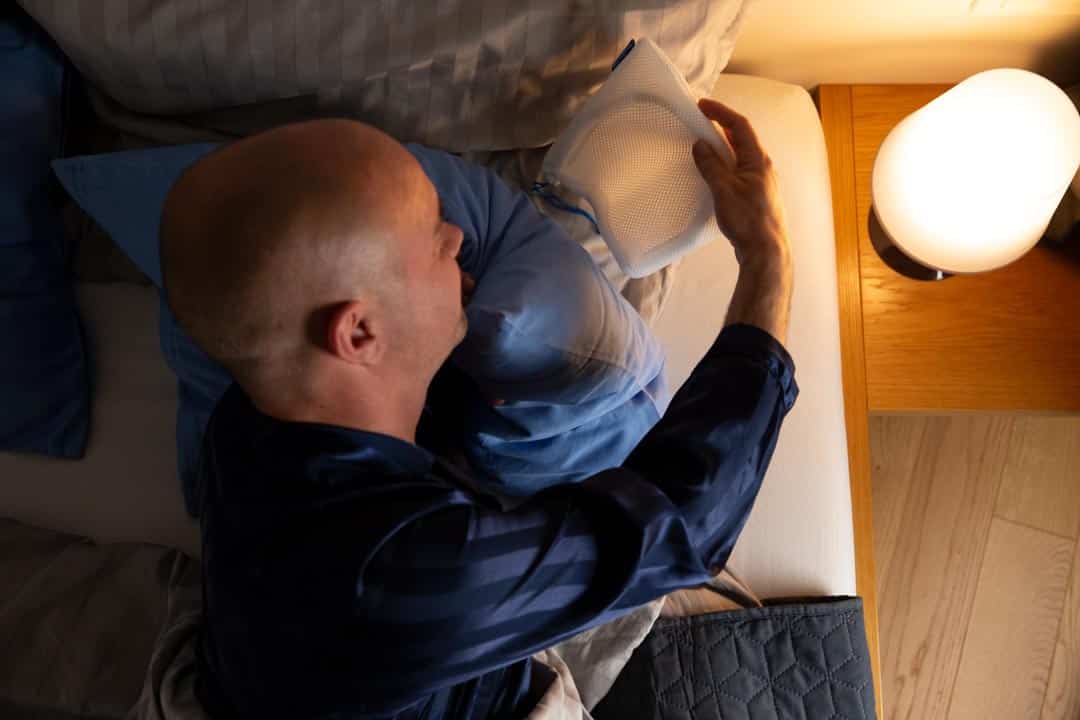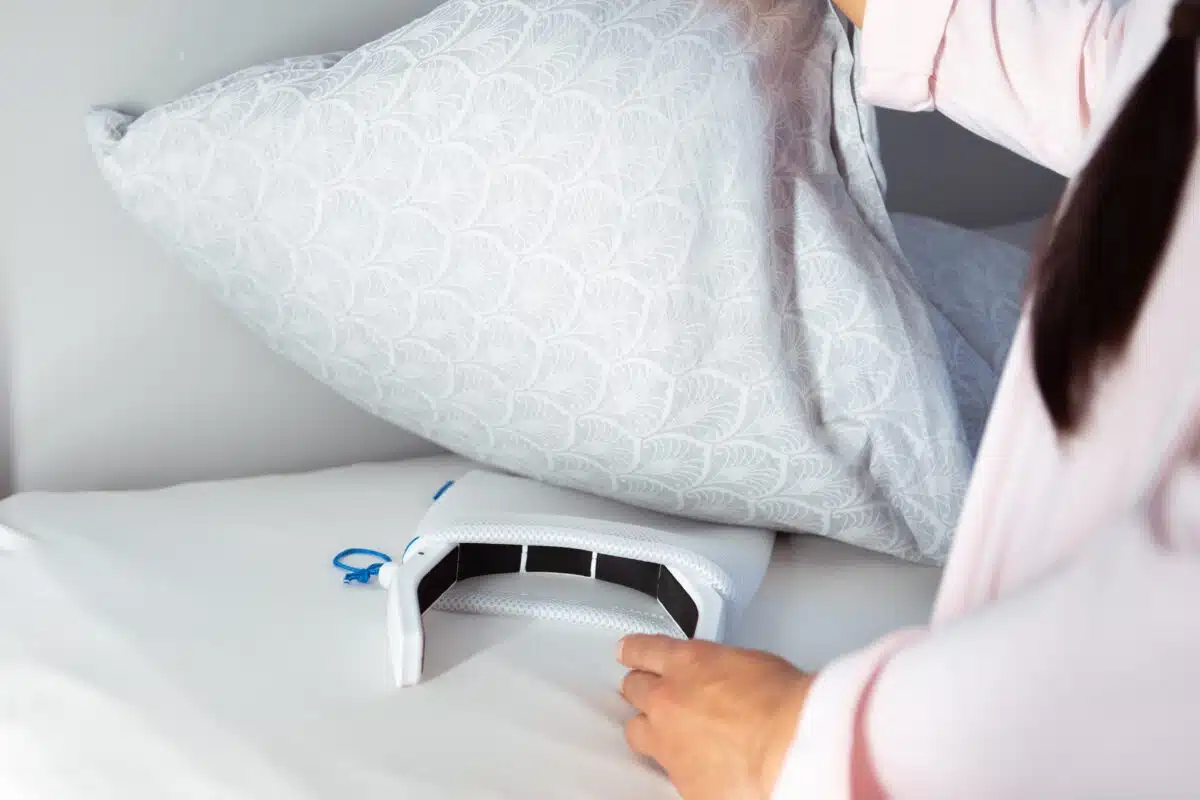
Understanding Fear: Insights into Brain Waves, Nightmares, Phobias and PEMF Theraphy
Fear is a fundamental emotion that serves as a protective mechanism, but when it becomes excessive, it can…

Sleeping accounts for about a third of a person’s life. When we experience sleep deficiency and sleepless nights, it can drastically hinder our quality of life and our emotional and mental states. But is it possible to get a great night’s sleep without taking any medication?
While we are asleep our brain functions mostly in the delta and theta frequencies throughout the night. Delta frequencies (high amplitude brain waves with a frequency of oscillation between 0.5 and 4 Hz) occupy about 10% of total sleep time in adults and occur between one to 1 1/2 hours after falling asleep when we are in dreamless sleep. The rest of the sleep time is in Theta (a frequency of 3.5 to 7.5 Hz; scientists class it as a “slow” activity) and for most people with sleep issues, the problem is in not being able to get into Theta. They occur when we are in light and REM sleep.
Table of Contents
When you have difficulty falling or staying asleep, usually that means the normal frequency patterns of the brain are altered. Stress-induced workflow, unexpected occurrences, burning out, or battling a health disorder can all contribute to a lack of good sleep. By mimicking the normal frequency patterns of the brain in the sleeping state, Omnipemf devices gently encourage your brain to fall asleep.
Omnipemf’s Improve Sleep program can be used before going to bed to help you fall asleep and maintain deep sleep for the rest of the night. The dominant emitted frequency is 4 Hz of theta brainwaves (magnetic flux density 2.5 mT). The accompanying emitted frequency is 2.67 Hz of delta brainwaves (magnetic flux density 0.25 mT).
Our brain has a specific ability to adapt to external frequencies. It is responding to external stimuli by synchronizing the central nervous system’s electrical activity to the rhythmic stimulus. If the rhythmic stimulus is a pulsed magnetic field, your brain can synchronize with the pulsed magnetic field. This synchronization is called “brainwave entrainment”.
How to use it?
You may use the Predefined Program Improve Sleep in many different ways.
1. Use the Improve Sleep 8-hour program for the duration of the night.
2. Improve Sleep 20-minute wind-down session followed by an 8-hour program.
3. Running a Theta Meditation or a Deep Relaxation session an hour before bed, followed by the Improve Sleep program.
It is also recommended that you experiment by placing the device in different places during the night, not just under the pillow. For some, the Improve Sleep program with an intensity of 2.5mT works best if placed further away from their head – on the nightstand or a pillow next to them – as it lowers the intensity that way and provides a more optimal sleeping environment for some. Test out both methods and see what works for you.
In our Advanced Mode, you can choose between Delta (1-4 Hz) or Theta frequencies (4-7 Hz), depending on your sleeping habits and which of those you lack or need more. We suggest trying out a Low-Theta frequency and gradually moving down to the lowest Delta.

Sleeping hygiene includes all the practices and habits you set for having a good sleep quality and as a result, full daytime alertness.
1. Maintain a strict sleeping schedule
As dull as it may sound, having a strict sleeping routine puts you to sleep automatically!
Once you start falling asleep at the same time every day, your body will get used to it and will recognize the designated time to rest and put you to sleep automatically! Each time you sleep at the same time, your brain sends a signal to your body, and the signal grows stronger and stronger through routine and time.
2. The bed is for sleep and love ONLY
Try not to use your phone in bed, watch Netflix, eat in your bed, and worst of all, don’t ever work in your bed! Reserve your bed for sleeping and making love only. Your brain will automatically associate your bed with sleeping.
3. Avoid blue lights at all costs
The blue light emitted from phones, TVs, computers, and tablets could be detrimental to your sleep. The light signals to your brain that it is daytime! Your brain responds by being awake as if it’s daytime, even if you are drained.
Make sure to put your devices away and avoid blue lights. Instead, consider picking up a book and immersing yourself in it. Just make sure it’s not a book of complex legal, finance, or scientific concepts that will keep you alert.
4. Shout “No!” to Sugar and Caffeine
Sugar puts your brain in ‘active’ and ‘high alert’ mode, making it much more difficult for you to relax your body and fall asleep.
Caffeine can also be detrimental to your sleep quality. The effects of caffeine on your body can last up to 14 hours!
Experiment by cutting sugar 3-4 hours before bed and perhaps restrict caffeine to mornings only.
5. Sip some Chamomile Tea
Chamomile has been used for thousands of years to tame anxiety and to reduce stress. The flower is mashed up, dried, and infused in hot water. Try drinking chamomile tea for 30-60 minutes before going to bed.
6. Breathe natural herbs like Lavender
Aromatherapy is the practice of using plants to heal and improve oneself. Plants are fused into what are called Essential Oils.
These essential oils could greatly aid you in fighting insomnia. Smelling Lavender and other Essential Oils could be a game-changer in improving your Sleep Hygiene. Please use Essential Oils and Lavender only externally!
7. Use the Improve Sleep program
This is the closest you can get to hovering a magic wand over your head and getting yourself to sleep. Most of our brain waves are continuously fired up throughout the day and aren’t always consistent with our needs. When it comes to finally getting some rest, your brain isn’t ‘energetically’ ready.
When we have trouble sleeping it is mainly due to our brain not being able to just shut off, and can feel jittery and uncontrollable. Improve Sleep program is explicitly designed to help you get into a state of ‘sleepiness.’

Napping tip
One good trick is to use the caffeine boost in a surprising way: drink it right before you nap. Caffeine, once ingested, takes around 20 minutes to fully function and get our heart rates rising. Therefore scientists now suggest that you drink a cup of coffee (a quick-shot of espresso, for example) immediately before you close your eyes for a 20-minute nap. As your alarm rings to wake you up, the caffeine will just be kicking in, speeding up the return to alertness after a refreshing cat nap.
Sleep also affects our health: “Numerous studies have found that insufficient sleep increases a person’s risk of developing serious medical conditions, including obesity, diabetes, and cardiovascular disease.” Let’s be responsible and take good care of our sleep.
1. Deprivation of sleep can lead to weight gain
One study by The University of Chicago found that being sleep deprived can cause you to gain weight. The research took 14 healthy adults and, within 14 days, discovered the relationship between Sleep and weight gain. Being sleep deprived increases your appetite and hunger. It also makes you crave unhealthy snacks and want to consume more in-between meals. When you’ve had enough sleep, you’re more likely to control your desire and willpower to say no to junk food. But when you haven’t had enough sleep, you’re most susceptible to becoming a victim of unhealthy foods.
2. Sleep promotes insight
Wagner and his colleagues demonstrated a unique relationship between sleep and learning in the form of insight gain. Mednick and Drummond wrote about this experiment in INSOM Issue 3, 2004: “Post-training, nocturnal sleep significantly increased the proportion of participants who gained insight into a hidden rule of the trained task. Participants were tested on the Number Reduction Task (NRT) before and after one of the following: a night of sleep, a night of sleep deprivation or a full day of waking. The NRT may be accurately performed using two possible methods. The first is an explicitly presented, brute force method whereby subjects apply two simple rules across seven steps to determine the final answer. The second requires divining the hidden structure of the task thereby allowing ‘solvers’ to leap ahead to the final answer after only two steps. Insight was determined as the moment participants were able to jump to a final answer without completing the entire trial, as well as being able to explicitly state the hidden rule. Wagner et al. found that participants who slept between tests gained significantly more insight than either of the waking groups.” We can conclude that enough sleep makes you better at logical deduction.
3. Sleep strengthens retention
Another experiment from 1996 done by Skaggs and McNaughton revealed what goes on in a rat’s brain while it sleeps. Awake, the rat was learning to walk through a maze. The electrodes placed on the rat, measured activity of certain neurons in the brain, which process information as we are learning. The researchers detected a specific pattern of electric impulses. When the rat fell asleep the electrodes were still attached and the brain activity was still being monitored. It showed that the brain was repeating the same electrical pattern as before while the rat was awake and learning. The pattern repeated itself over and over again at great speed. This leads to the conclusion that while we sleep the brain reinforces what we were learning before falling asleep.
The abstract of Skaggs’ and McNaughton’s paper tells us: “The correlated activity of rat hippocampal pyramidal cells during sleep reflects the activity of those cells during earlier spatial exploration. Now the patterns of activity during sleep have also been found to reflect the order in which the cells fired during spatial exploration. This relation was reliably stronger for sleep after the behavioral session than before it; thus, the activity during sleep reflects changes produced by experience. This memory for temporal order of neuronal firing could be produced by an interaction between the temporal integration properties of long-term potentiation and the phase shifting of spike activity with respect to the hippocampal theta rhythm.” Various other studies showed the same is true for humans. Memory representations are reactivated during slow-wave sleep after learning, and these reactivations cause a beneficial effect of sleep for memory consolidation.
4. Sleep promotes neurogenesis
The recent research showed that even adults grow and develop nervous tissue. The process is called neurogenesis. Deng, Aimone and Gage (2010) wrote: “newborn neurons at different maturation stages may make distinct contributions to learning and memory. In particular, computational studies suggest that, before newborn neurons are fully mature, they might function as a pattern integrator by introducing a degree of similarity to the encoding of events that occur closely in time.”
Neurogenesis is an important developing and growing area in scientific research. Frontiers in cellular neuroscience published an article Detrimental role of prolonged sleep deprivation on adult neurogenesis in 2015. Sleep deprivation tends to cause harm to neurogenesis, which in consequence can influence our memory and learning ability. Of course it is necessary to mention that sleep is only one of the factors which influence neurogenesis. Important are also exercise, food we eat, age etc.
NeoRhythm has not been evaluated by the FDA. These products do not claim to diagnose, treat, cure, or prevent any medical conditions. Always consult your medical doctor regarding any health concerns.)